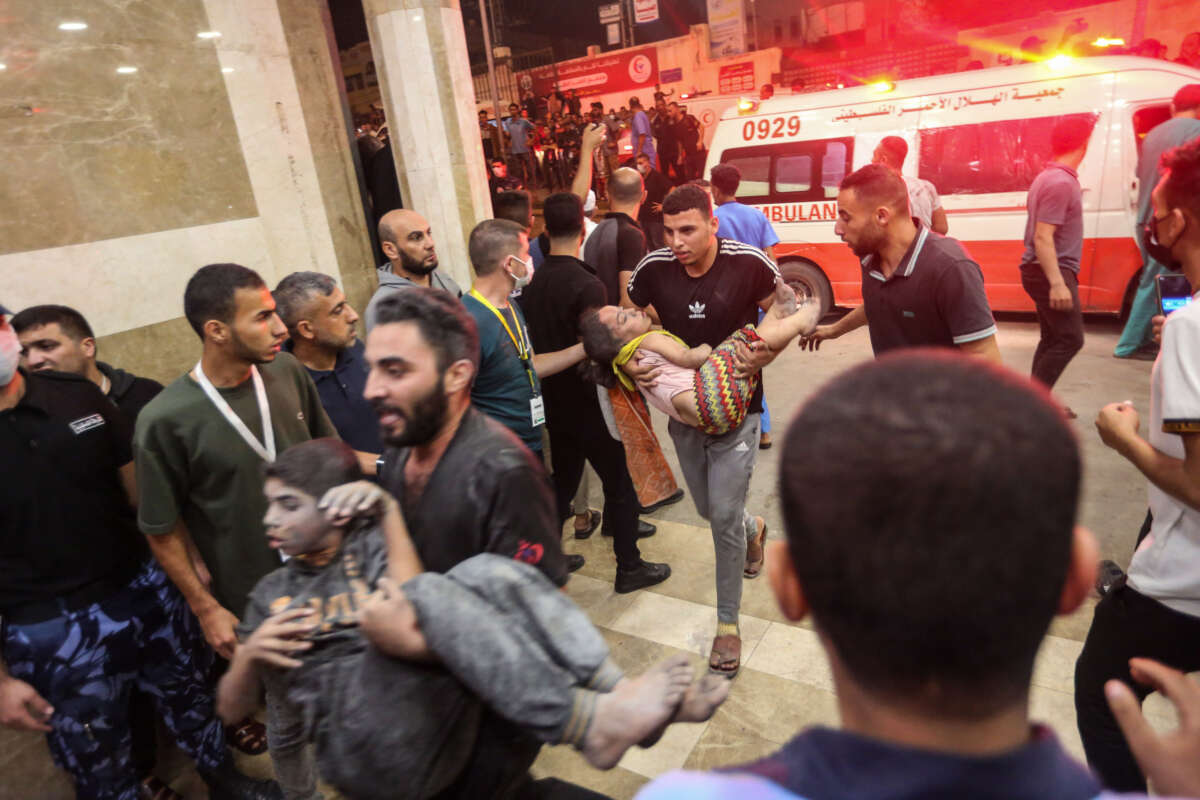The health system in Gaza is on the verge of “complete collapse,” Palestinian health ministry officials have said, with over a third of hospitals shuttered and the rest rapidly running out of capacity and resources due to Israel’s blockade of electricity, water and humanitarian aid.
Al Jazeera reports that a health ministry spokesperson has said that the health system is completely out of service, and hospitals have reported having to stop all but emergency services, if they are operational at all. One-third of hospitals and two-thirds of clinics in the Gaza Strip are now non-functional, UN officials have said.
Gaza’s main hospital in the south has said that it will have to stop performing lifesaving operations on Wednesday evening due to fuel shortages caused by the Israeli blockade, according to the UN.
The health ministry warned on Tuesday that electric generators for hospitals will run out of fuel in 48 hours. Doctors are warning that Gaza’s 130 premature babies who are relying on ventilation machines, as well as a wide swath of other people on life support, will die when the hospitals run out of fuel.
“We are talking about a complete collapse of the health system, which has become unable to deal with the large number of wounded arriving at hospitals, with limited capabilities to treat the wounded, in addition to the rapid depletion of fuel, which will lead to a power outage,” said Palestinian health ministry spokesperson Ashraf Al-Qudra on Tuesday, according to NBC. “We are only a few hours away from hospitals being out of service, and this was confirmed by international organizations familiar with the health situation in the Gaza Strip.”
Palestinian health officials reported on Wednesday that Israeli strikes have killed at least 6,546 Palestinians in Gaza, including 2,704 children, since Israel’s war began October 7, with at least 17,000 people injured. Israeli strikes have killed at least 700 people in the past 24 hours, the ministry of health reported.
The UN Relief and Works Agency for Palestine Refugees in the Near East, or UNRWA, reported on Wednesday that the Israeli blockade of fuel across the region means that the agency will be forced to significantly reduce or stop its humanitarian operations altogether on Wednesday night.
This means that countless Gazans’ “only lifeline” could soon be no longer operational, UNRWA officials said. The fuel blockade means that what little supplies could be transported to those in need would have no way of reaching them. Israeli strikes have killed 38 UNRWA staff members in Gaza since the war began, the agency reported.
Conditions inside the hospitals are already dire. Doctors have reported having to perform operations without anesthetic and using vinegar as an antiseptic. The facilities are overcrowded and operating at 150 percent capacity.
According to the United Nations Population Fund, there are currently 50,000 pregnant people in Gaza, many of whom are missing appointments and checkups due to Israel’s relentless bombing campaign, while also facing difficulties and uncertainties surrounding giving birth.
Infectious disease outbreaks have begun due to overcrowding in camps and hospitals, officials have said. Health officials have said that they are seeing outbreaks of chickenpox and scabies, with experts warning that cholera and typhoid outbreaks may be on the horizon.
One doctor said that the region’s largest hospital, Al-Shifa in Gaza City, “will just be a mass grave” if electricity runs out. Al-Shifa senior surgeon Marwan Abusada told CNN on Monday that the hospital only had enough fuel to last a maximum of two days at that point.
Angry, shocked, overwhelmed? Take action: Support independent media.
We’ve borne witness to a chaotic first few months in Trump’s presidency.
Over the last months, each executive order has delivered shock and bewilderment — a core part of a strategy to make the right-wing turn feel inevitable and overwhelming. But, as organizer Sandra Avalos implored us to remember in Truthout last November, “Together, we are more powerful than Trump.”
Indeed, the Trump administration is pushing through executive orders, but — as we’ve reported at Truthout — many are in legal limbo and face court challenges from unions and civil rights groups. Efforts to quash anti-racist teaching and DEI programs are stalled by education faculty, staff, and students refusing to comply. And communities across the country are coming together to raise the alarm on ICE raids, inform neighbors of their civil rights, and protect each other in moving shows of solidarity.
It will be a long fight ahead. And as nonprofit movement media, Truthout plans to be there documenting and uplifting resistance.
As we undertake this life-sustaining work, we appeal for your support. Please, if you find value in what we do, join our community of sustainers by making a monthly or one-time gift.
